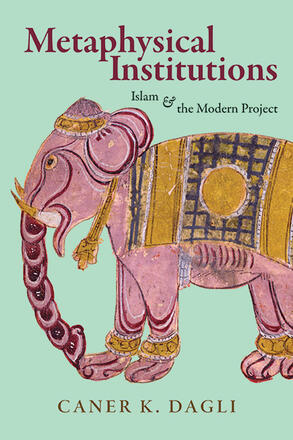
Metaphysical Institutions
Islam and the Modern Project
Alternative formats available from:
Uses the intellectual encounter between Islam and modernity to explore the nature of culture, civilization, religion, and tradition.
Description
In Metaphysical Institutions, Caner K. Dagli explores the ultimate nature of the realities we call religions, cultures, civilizations, and traditions through the lens of a particular question often limited to religious studies, history, and anthropology, namely: "What is Islam?" The book is both a philosophical treatise about the nature of shared thinking that uses the encounter between the Modern Project and Islam as an illustrative example, and an exploration of the conceptualization of Islam in light of the metaphysics of consciousness and meaning.
Dagli first develops a comprehensive theory of the institution and then expands its meaning to include a new category called "metaphysical institutions," with the goal of establishing both necessary and empirically variable features of all institutions, including those that deal with ultimate questions. The new model is then used to analyze questions of authority and autonomy, rationality and imitation, the universal and the particular, and other enduring questions.
Caner K. Dagli is Associate Professor in the Department of Religious Studies at the College of the Holy Cross and the author of Ibn al-ʿArabī and Islamic Intellectual Culture: From Mysticism to Philosophy. He is also one of the general editors of The Study Quran: A New Translation and Commentary.
Reviews
"This is a serious, imaginative, and thought-provoking deep dive into the relationship between Islam and the 'Modern Project.' It boldly expands no less than it challenges our understanding of both. Metaphysical Institutions will spawn robust and productive debate on numerous fronts, the question 'What is Islam?' for example, likely never ringing the same again. Caner Dagli has gifted the field with a handsome, fresh, courageous, thoughtful, and, no doubt, seminal contribution." — Sherman A. Jackson, King Faisal Chair of Islamic Thought and Culture at the University of Southern California
"Metaphysical Institutions is a watershed achievement, and it is sure to become a major work of theory for decades to come. Dagli engages ongoing conversations in religious studies concerning how to theorize 'religion,' while also contributing to debates in the fields of anthropology, philosophy, and cultural studies concerning the very nature of social reality and what it means to study nonmodern traditions in a post-Enlightenment world. The structure of the book and its accessibility will allow scholars to make wider connections with their own work, and it will also give them first-hand exposure to notions of 'Islam' and how to conceptualize it."— Muhammad U. Faruque, author of Sculpting the Self: Islam, Selfhood, and Human Flourishing
"What is Islam? Who are Muslims? How do we talk about religion, tradition, culture, and civilization in the context of modernity? In this book, Caner Dagli offers us a rich and sophisticated discussion of such broad and complex questions that are being asked urgently in the contemporary period. By reassessing some fundamental assumptions about these related concepts, he introduces readers to a world of fruitful ambiguity where it is possible to craft meaningful answers through a theoretically rigorous process and the use of appropriate conceptual tools. Bound to generate animated conversations in academia and beyond." — Asma Afsaruddin, Class of 1950 Herman B Wells Endowed Professor, Indiana University
"Metaphysical Institutions perspicaciously and convincingly argues that metaphysical assumptions and worldviews—both well and ill-conceived, and acknowledged and unacknowledged—constitute the real bases for all of our theorizations and attendant conceptualizations of selfhood, religion, culture, and civilization in general, and Islam and Muslims in particular." — Mohammed Rustom, Professor of Islamic Thought and Global Philosophy, Carleton University